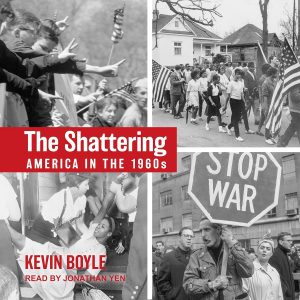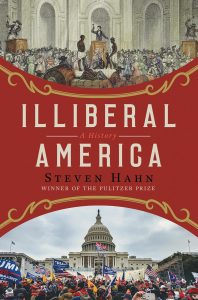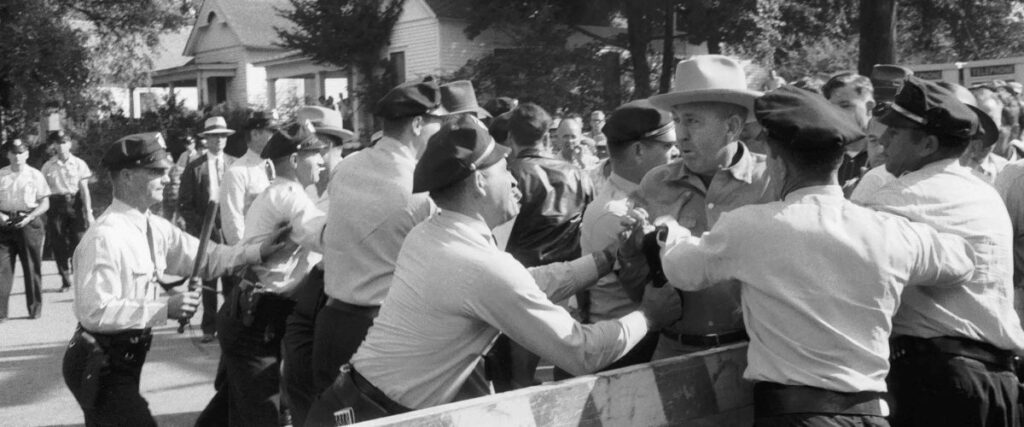As I write, it is four weeks until the election. The polls on reputable sites like Fivethirtyeight.com are giving the Harris-Walz ticket a very slight advantage, with the results coming down to one or two states.
Those of us who lean left in politics frequently find ourselves in ultimately fruitless conversations in which one or the other of us says something like: “I don’t see how it’s close. I don’t see how so many of our fellow citizens could vote for Trump. Again. Despite everything.”
I am reading two important recent books that offer something much better than uncomprehending outrage. The books are Illiberal America: A History by historian Stephen Hahn and The Shattering: America in the 1960s by another fine historian, Kevin Boyle. I commend them both very highly. Both describe the illiberal impulses in American life that have so frequently prevailed in our history and could easily do so again one month from now.
Boyle’s book goes into detail about “the shattering” of America during the 1960s around three primary conflicted issues: race, sex and war. His story of American racial conflict actually begins in Chicago rather than in the South. Boyle describes the hard struggle of white working-class people of Polish immigrant background to claw their way to economic stability and then prosperity in the early-to-mid-20th century. He also describes their fierce resistance to the racial integration of their white ethnic enclaves, including consistent outbreaks of violence against Black families trying to move in.
The attention of Martin Luther King was drawn to Chicago, and his efforts there faced a virulent resistance that deeply discouraged him. This was not Old South racism. It was Northern “white ethnic” racism. The history and context were different. Only the hatred was the same.
Boyle also takes the reader into the story of the decades of resistance to the integration of the public schools, including the intense fight over mandatory busing policies, such as in Boston, to effect school desegregation. Inspiring efforts on behalf of equal rights and quality schools for all children were met by equally determined crusades on the part of white activists, many of them claiming Christian and certainly family values motivations.

Hahn’s book takes up a much longer time horizon. His depressing hypothesis is that liberal and illiberal tendencies have competed in this country from the beginning. Both are part of the bedrock of America and both surface in every stage of American history.
In chapters touching down on the Colonial period, the early American republic, the 1830s, the period after the Civil War, the early 20th century, the 1930s, the 1960s, the 1990s and today, Hahn repeatedly excavates the largely buried history of illiberal America.
Each period Hahn describes has its own colorful/awful characters, organizations and movements. Each chapter is worth a careful reading. But the cumulative picture is essentially this: White Protestant Americans, the dominant early settler populations in the U.S. (into which many but not all later Euro-immigrant populations were identity-grafted), have consistently negated their purported democratic values in waves of attacks on the rights, growth and even presence of other populations within this nation.
These attacks often have gone beyond mainstream democratic political machinations to include violent and at times “expulsionist” strategies, forcibly removing unwanted populations from localities or the nation itself. In every period, Hahn documents ferocious pushback to any advance toward social, economic and political equality and integration on the part of nonwhite Americans.

The message of illiberal, largely white, largely “Christian” America to everyone else here over the centuries has been: This is our country, and we will retain power here. If we allow you to stay among us (in this town, or in this country) you will be subordinate to us. If you forget your “place,” we will find ways to make you remember. Whatever we understand democracy to be, it will be subordinated to our consistent effort to retain this fundamental structuring of social power.
What does this mean for the current moment? I believe Donald Trump is the latest and among the most significant historical embodiments of American illiberalism. He exudes and articulates centuries-old patterns of entitled, defiant, often aggrieved, vaguely Christian, definitively white, frequently expulsionist “America First” illiberalism. Sadly, there always has been a market for such politics and such politicians in this country.
People will vote for Donald Trump and candidates he has endorsed for a variety of reasons — including the economy, taxes, abortion, foreign policy, local issues and simple partisan identity, among other things.
Those who will make that choice either do not notice Trump’s fundamental illiberalism or it is not significant enough to be disqualifying for them.
But many of the rest of us continue to believe the struggle between liberal democracy and illiberal authoritarianism is precisely what the last three presidential elections have been about. We will be ready to take seriously debatable policy issues when this most important of all questions for a democracy has been resolved.
But will it ever be resolved? Or are we doomed to this same fight on an endless loop?
This article first appeared on Baptist News Global.

